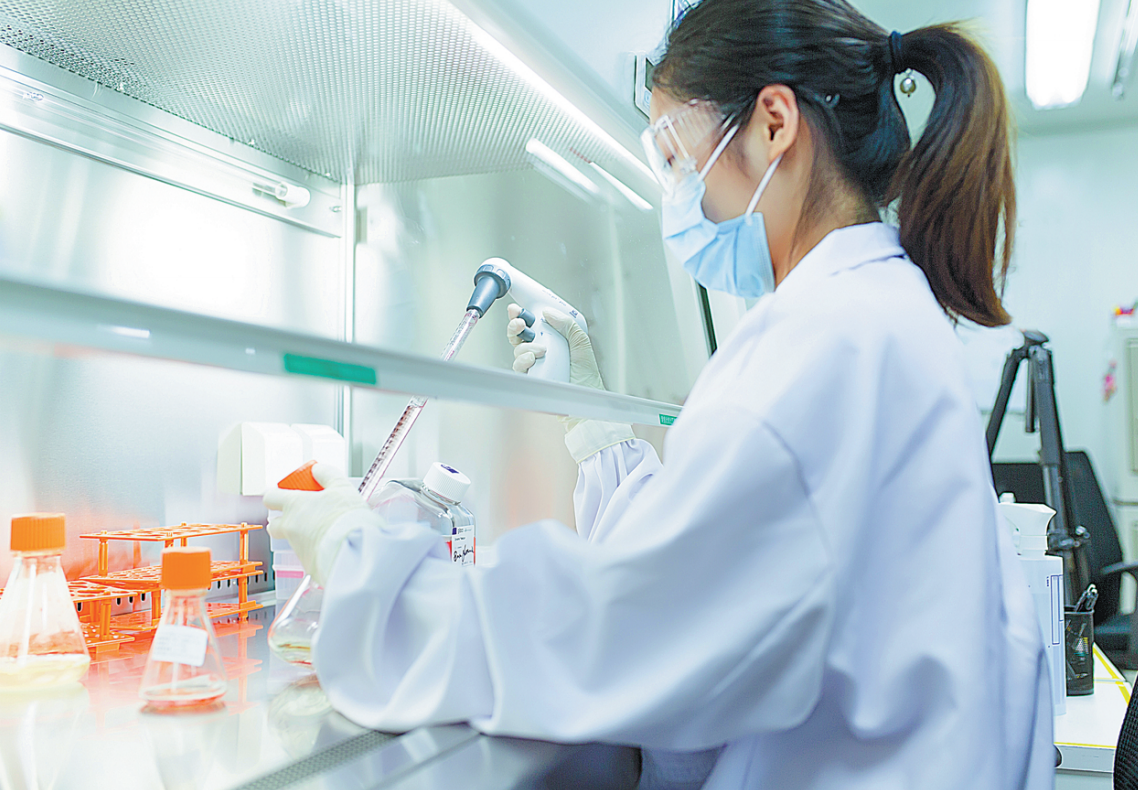Innovation gives Chinese biopharma edge on global stage


Tie-ups helping companies expand influence, market coverage
Innovative domestic biopharmaceutical companies are beginning to bring their research and development results beyond China after at least 15 years of accumulating experience in new drug development and carrying out clinical trials, industry experts said.
Such high-speed growth of Chinese medical research results will stay on pace for another decade before entering a stabilization phase, they said.
Recent examples include a new drug application for an innovative drug to treat neuroendocrine tumors developed by Hutchison China MediTech-or Hutchmed-which was submitted to the United States Food and Drug Administration. Its market application in Europe is underway.
In the US, the oral capsule, which completed its market launch in China in January, was granted fast track status in its application to treat pancreatic and non-pancreatic NETs, the company said.
"Many domestic pharmaceutical companies believe that the local market is seeing its best years of vitality and the overseas market is also a land of mass opportunities," said Ma Jun, an expert with the Chinese Society of Clinical Oncology.
"Medicines from China can enrich drug options for overseas markets and provide foreign patients with therapies at lower prices," Ma said.
Data showed that a rising number of strong domestic medical plays are showcasing themselves on the international stage and are becoming destinations for capital investment.
Figures showed that the total market value of innovative Chinese biotechnology companies and ecosystem participants listed on the Nasdaq, and in Hong Kong and Shanghai was nearly $220 billion last year, which surged rapidly for consecutive years from $12 billion in 2017.
Hutchmed's new drug surufatinib is the world's first therapy to treat NETs of many kinds.
Su Weiguo, chief scientific officer of Hutchmed, said that after evaluating the drug's functioning mechanism, effectiveness and safety, they are confident of its future potential in both domestic and foreign markets.
"It also showcases to the global medical community that China's innovative drugs are rapidly benefiting patients in the country and even the world with cutting-edge research concepts, standardized and rigorous R&D processes and high levels of quality," said Chen Kaixian, an academician with the Chinese Academy of Sciences.
In the field of gene sequencing, some domestic startups said that their speed of development in overseas markets even outgrew that in the local market.
"Revenue from overseas markets, mainly Europe and the US with their developed life sciences and biomedical foundations, accounted for 35 percent of the company's global sales. Globalization is one of the company's key orientations for the future," said Li Ruiqiang, founder and CEO of Novogene, a Beijing-based provider of genomic services and solutions established a decade ago.
Domestic gene technology firm Burning Rock, dedicated to R&D of tumor testing, was listed on the Nasdaq last year after its establishment in 2014. Han Yusheng, founder and CEO of the company, said that some of their products are superior to US counterparts in various indicators by US Food and Drug Administration evaluations. They have advantages in price and order delivery speed as well.
"In addition to the US and Europe, we regard Japan and some leading economies in South America, including Brazil, as overseas markets worth expanding to," Han said.
Both Li and Han made the remarks at an industry summit held by US-based Illumina, a world-leading biotech company, in Shanghai in mid-May.
Li Qing, vice-president of Illumina and general manager of Illumina Greater China, said the summit was held in part due to rapid advances in the gene sequencing industry.
"We attributed the explosion to the strengthening of scientific research in the industry and the soaring development of clinical applications," Li said.
Last year, the compound annual growth rate of data output in gene sequencing in China was 33 percent per quarter, according to an Illumina report.
I-Mab, a Shanghai-based biomedicine startup that has built an innovative and competitive pipeline mainly in oncology and autoimmune diseases since its founding in 2016, reached a strategic collaboration agreement with AbbVie from the US over I-Mab's CD47 antibody for next-phase R&D and global commercialization. I-Mab has reaped 18.9 billion yuan ($2.94 billion) from the collaboration.




































